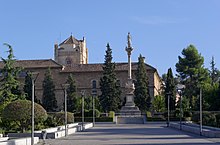University of Granada
 | |
| Latin: "Universitas Granatensis" | |
| Established | 1531 |
|---|---|
| Endowment | 395,663,000 € |
| Rector | Pilar Aranda Ramírez |
| Students | 80,000[1] |
| Location | , |
| Affiliations | Coimbra Group, UNIMED |
| Website | http://www.ugr.es |
| File:Logo Universidad de Granada.svg | |
The University of Granada (Template:Lang-es, UGR) is a public university located in the city of Granada, Spain, and founded in 1531 by Emperor Charles V. With approximately 80,000 students, it is the fourth largest university in Spain.[2] Apart from the city of Granada, UGR also has campuses in Northern Africa (Ceuta and Melilla).
Every year over 2,000 European students enroll in UGR through the Erasmus Programme, making it the most popular European destination.[citation needed] The university's Center for Modern Languages (CLM) receives over 10,000 international students each year.[3] In 2014, UGR was voted the best Spanish university by international students.[4]
History
In 1526 a college was founded in Granada by Holy Roman Emperor Charles V for the teaching of logic, philosophy, theology and canon law.[5] On 14 July 1531, the establishment of a studium generale with the faculties of theology, arts and canon law was granted by a papal bull by Clement VII, marking the birth hour of the university.[5][6]
The university has an important heritage thanks to its policy of using buildings of historical and cultural value such as the former madrasah and the former Royal Hospital of Granada. Furthermore, the university has major new facilities committed to innovation, such as the Parque Tecnológico de Ciencias de la Salud.
Rankings
According to several rankings,[7] the University of Granada ranks among top ten best Spanish universities and holds first place in Translation and Interpreting studies. It is considered the national leader in Telecommunications Engineering as well. UGR also plays a major role in scientific output, placing high in national ranks and being one of the best world universities in computing and mathematics studies.[8]
Centres and Qualifications
UGR is composed of 5 Schools, 22 Faculties and 116 Departments responsible for teaching and researching into specific subject areas.[9] They are spread over five different campuses in the city of Granada (Centro, Cartuja, Fuentenueva, Aynadamar and Ciencias de la Salud), plus two more campuses located in the cities of Ceuta and Melilla, Spanish territories in Northern Africa.[10]
Centres located in Granada

- School of Building Engineering
- School of Architecture
- School of Civil Engineering
- School of Information Technology and Telecommunications
- Faculty of Fine Arts
- Faculty of Sciences
- Faculty of Sport Sciences
- Faculty of Economics and Business
- Faculty of Education
- Faculty of Political Science and Sociology
- Faculty of Health Sciences
- Faculty of Labour Studies
- Faculty of Communication and Documentation
- Faculty of Law
- Faculty of Pharmacy
- Faculty of Philosophy and Humanities
- Faculty of Medicine
- Faculty of Dentistry
- Faculty of Psychology
- Faculty of Social Work
- Faculty of Translation and Interpreting
Campus located in Ceuta
- Faculty of Health Sciences
- Faculty of Education and Humanities
Campus located in Melilla
- Faculty of Social Sciences
- Faculty of Education, Economy and Technology
- Faculty of Nursing
The University of Granada also offers a wide range of postgraduate programmes (Master's Degrees, Doctorate Programmes and UGR's Postgraduate studies), made up of studies adapted to the European model.
School for Modern Languages
The UGR began admitting international students in 1992 with the founding of the School for Modern Languages (Centro de Lenguas Modernas). As of 2009-2010, there were some 5,000 international students, including Erasmus programme exchange students from the European Union. The CLM has agreements with 20 universities and study abroad organizations in the U.S. and in Canada in order to bring North Americans to the UGR, including the American Institute For Foreign Study, Arcadia University, International Studies Abroad and the University of Delaware.[11]
Famous alumni
- Nicolás Salmerón y Alonso, President of the First Spanish Republic
- Fernando de los Ríos Urruti, prominent politician during Second Spanish Republic
- Niceto Alcalá-Zamora, President of the Second Spanish Republic
- Blas Infante, father of Andalusian nationalism
- Federico García Lorca, man of letters from the Spanish Generation of '27
- Frederick Forsyth, British author.
- Juan Francisco Casas, Spanish artist.
- José de Salamanca, Marquis of Salamanca, Spanish businessman and politician.
- Francisco de Paula Martínez de la Rosa, Spanish statesman and dramatist.
- Joaquín Sabina, Famous poet, singer and composer
- Luis Lloréns Torres, Puerto Rican poet
- Antonio Muñoz Molina, writer and former director of Instituto Cervantes of New York City
- Angel Ganivet, Spanish writer precursor to the Generation of '98 and ambassador in Helsinki.
- Pablo Heras-Casado, Spanish conductor.
See also
Notes and references
- ^ https://www.ugr.es/pages/universidad/saludo_rector
- ^ "http://www.ine.es/prensa/np712.pdf" (PDF). www.ine.es. Retrieved 2015-04-29.
{{cite web}}: External link in|title= - ^ "University of Granada , GRANADA, SPAIN, Ranking, Reviews, MBA, Master, Courses". Retrieved 23 July 2015.
- ^ Europa Press (10 January 2014). "La Universidad de Granada, la mejor de España por los estudiantes internacionales". europapress.es. Retrieved 23 July 2015.
- ^ a b Jílek, Jubor (ed.): "Historical Compendium of European Universities/Répertoire Historique des Universités Européennes", Standing Conference of Rectors, Presidents and Vice-Chancellors of the European Universities (CRE), Geneva 1984, p. 160
- ^ Frijhoff, Willem: "Patterns", in: Ridder-Symoens, Hilde de (ed.): A History of the University in Europe. Vol. 2: Universities in Early Modern Europe (1500–1800), Cambridge University Press, 1996, ISBN 0-521-36106-0, pp. 43–113 (80–89)
- ^ http://www.unex.es/conoce-la-uex/estructura-academica/centros/ccdeporte/archivos/ficheros/SUPLEMENTO%20EL%20MUNDO%2050%20CARRERAS.pdf
- ^ "La UGR se distancia de Sevilla y adelanta a Córdoba en excelencia". Retrieved 23 July 2015.
- ^ "University of Granada". Retrieved 23 July 2015.
- ^ "University of Granada". Retrieved 23 July 2015.
- ^ "Collaborating institutions and study abroad programs". Retrieved 23 July 2015.
